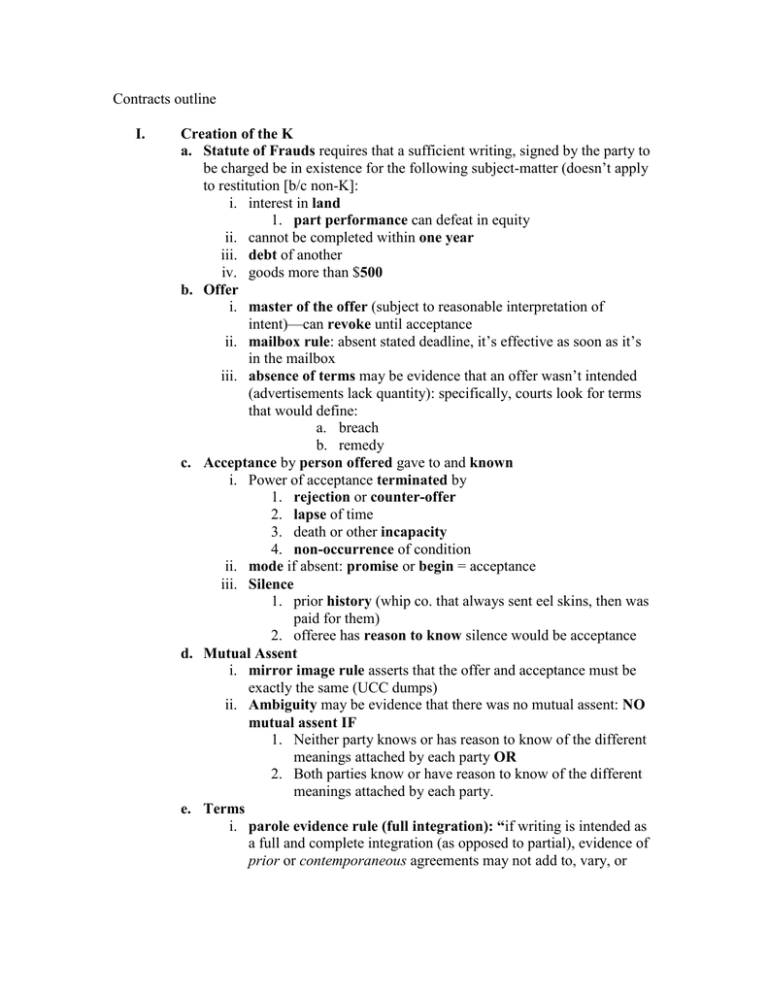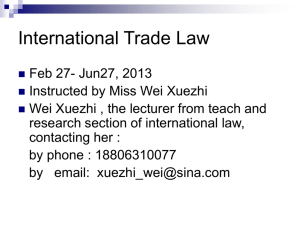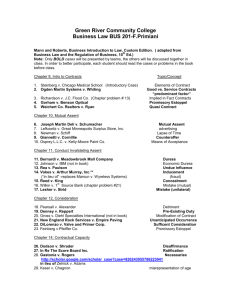Contracts outline land
advertisement

Contracts outline I. Creation of the K a. Statute of Frauds requires that a sufficient writing, signed by the party to be charged be in existence for the following subject-matter (doesn’t apply to restitution [b/c non-K]: i. interest in land 1. part performance can defeat in equity ii. cannot be completed within one year iii. debt of another iv. goods more than $500 b. Offer i. master of the offer (subject to reasonable interpretation of intent)—can revoke until acceptance ii. mailbox rule: absent stated deadline, it’s effective as soon as it’s in the mailbox iii. absence of terms may be evidence that an offer wasn’t intended (advertisements lack quantity): specifically, courts look for terms that would define: a. breach b. remedy c. Acceptance by person offered gave to and known i. Power of acceptance terminated by 1. rejection or counter-offer 2. lapse of time 3. death or other incapacity 4. non-occurrence of condition ii. mode if absent: promise or begin = acceptance iii. Silence 1. prior history (whip co. that always sent eel skins, then was paid for them) 2. offeree has reason to know silence would be acceptance d. Mutual Assent i. mirror image rule asserts that the offer and acceptance must be exactly the same (UCC dumps) ii. Ambiguity may be evidence that there was no mutual assent: NO mutual assent IF 1. Neither party knows or has reason to know of the different meanings attached by each party OR 2. Both parties know or have reason to know of the different meanings attached by each party. e. Terms i. parole evidence rule (full integration): “if writing is intended as a full and complete integration (as opposed to partial), evidence of prior or contemporaneous agreements may not add to, vary, or contradict the terms of the writing.” [integration is q of fact for ct.] UNLESS 1. Promise has separate consideration or 2. Is not ordinarily included in such a writing. 3. Partial integration=consistent additional terms ii. Ambiguous terms 1. Some cts. require ambiguity on face before admission of evidence, others allow evidence of ambiguity. 2. To solve ambiguity look to usage of trade/circumstances. 3. A policy tends to resolve ambiguities against drafting party . . . iii. Bound by what she signs [or agrees to] UNLESS 1. misrepresentation [holding it out as something it isn’t— nondisclosure and concealment—unilateral mistake] 2. reasonable belief that it isn’t in the terms of the K 3. unconscionability=absence of meaningful choice together with terms that unreasonably favor the other party 4. public policy [waiver of implied warranty] 5. hidden, inconspicuous, or innocuous to reasonable person 6. Against reasonable expectations [extension of ins. K law] a. assent is given if there is reason to believe like terms are elsewhere and adoption is integrated agreement b. reasonable standard treats everyone alike c. rejects any term that the party seeking assent has reason to know other party wouldn’t actually assent to if he/she knew the term 7. duress (rescind) a. Common law had (1) duress of person (gun to the head) and (2) duress of goods (pawned palm $100 agreement to $200). b. Modern test: i. immediate possession of goods threatened ii. no practicable alternative (high threshold) 8. mutual mistake at essence of K 9. illegal (rescind) 10. Fraud iv. battle of the forms: UCC 2-207 (alt. of mirror image rule) [Restatements (second) roughly follows] 1. Acceptance w/o mirror image [additional or different terms]—unless acceptance made expressly conditional to different terms 2. Any discrepancies are proposals which become part of the K UNLESS a. limits acceptance b. material alters terms II. c. one party receives notification before or w/in a reasonable time after that it is unacceptable 3. Actions of party which recognize the existence of K create a K, even in violation of (1). Then all agreeing terms are K. Which promises should we enforce? a. Consideration: i. definition 1. Any legal, actual benefit to promisor or detriment to promisee. a. Requirements K (supply all your requirements) b. output K 2. Mutual reciprocal inducement a. exchange of gifts doesn’t fulfils b. nominal, or pretentious consideration doesn’t fulfill 3. Mutuality of obligation: “both must be bound or neither will be” [e.g. passing the gasoline savings K . . .] b. Restitution i. PP has conferred benefit on DD ii. Retention w/o compensation would be unjust 1. Promise made in recognition of benefit previously received is binding to the extent necessary to prevent injustice unless a. benefit is a gift or promisor hasn’t otherwise been unjustly enriched OR b. value of promise is disproportionate to benefit c. Generally easy for persons who normally charge for services (doctor administering antidote), but not very likely to work in all cases. c. Reliance (equitable estoppel) i. Was there a promise promisor should have reasonably expected to induce action or forbearance? ii. Did the promise induce such action or forbearance? iii. Can injustice be avoided only by enforcement? iv. an exception: marriage covenants, charities III. Revising the K a. preexisting duty rule: a promise to do what one already is bound to do isn’t consideration IV. Performance of the K i. ACCORD AND CONSIDERATION 1. Good faith dispute (the uncertainty gets it outside of the preexisting duty rule) b. c. d. e. f. g. h. 2. check as payment in full cannot be ignored (if tender accepted, then it’s good) Conditions: no obligation unless occurrence i. express (strict performance): “on the condition that we buy the land” ii. constructive: 1. Give meaning to intent 2. policy against forfeiture presumption that it’s promise iii. When enforceable although condition isn’t met: 1. waiver: relinquishment of known right (do they need consideration?) 2. estoppel—induces one party to wait, so condition won’t happen 3. express conditions of Satisfaction a. must be reasonable/objective if primarily functional b. must have actual, subjective dissatisfaction when primarily aesthetic 4. Impossible for condition to be met, becomes unconditional 5. If party in control of condition prevents it from occurring, becomes unconditional 6. Anticipatory repudiation before condition Promises (express and implied) i. obligation: full performance ii. condition: substantial performance Performance due (look to (1) presumed intent and (2) circumstances including custom and policy) 1. PRESUMPTION: concurrently conditional—same time a. installments: mini Ks [division] b. perfect tender for goods 2. Dependant—performance of one is conditional to the performance of the other (insurance) 3. Mutual and independent— (lease) each may recover from the other regardless of performance rescind (pre-contractual obligation) anticipatory breach (condition excused—constructive conditions and material breach) only if i. bilateral contract AND ii. PP hasn’t fully performed substantial performance (condition discharged, obligation isn’t)—same in equity and law; also distinguish from rescind i. test: Whether performance meets the essential purpose of K— something less than perfect, but close to perfect (9/12 mos. doesn’t fulfil) ii. result: PP MUST pay under the K, but has an offset b/c of their claim under the obligation. materiel breach: opposite of substantial performance V. Remedies a. Expectancy i. No punitive damages ii. Valuation 1. c/c a. economic waste b. ugly fountain rule 2. FMV – K OR K – FMV (expectancy first) at t/p 3. reasonable cover [(cover - K) + incidental costs] b. Limitations on Expectancy Damages i. Foreseeability (at time of formation as likely consequence of breach—breach of Morgue’s duty—emotional D) 1. natural consequence or known should have known 2. Tacit assent test- would have agreed had known 3. UCC rejects tacit assent ii. Doctrine of Avoidable Consequences 1. Exp + profit or K – savings [don’t add constant overhead expenses] 2. Expenses of mitigation okay 3. expandable business deserves 2 instead of 1 [manufacturing is presumed] 4. employment must be substantially similar/lower offer for same work won’t mitigate iii. Reasonable degree of certainty iv. Stipulated D 1. Test for enforceability a. reasonable forecast b. time of formation 2. Limitation on liability okay (if not unconscionable) 3. Can’t agree that breach will result in enforcement in equity c. Non-expectancy recovery i. Reliance 1. when expectancy not available 2. post/pre K formation arguable (Dempsy, Algernon-Blaire) 3. Reliance expenses - loss under K (if any) ii. Equitable relief 1. Only if remedy at law is not adequate a. Land- damages presumed unique, recoverable b. Goods- need great totally unique 2. Discretionary grant of relief a. aversion to involuntary servitude [but negative injunction if unique skill] b. won’t enforce if benefit disproportionate to harm c. may order injunction relief d. won’t award if not want to get entangled complex affairs iii. Restitution- compensate for value of benefit conferred on D 1. Obligation independent of contract 2. Elect to pursue remedy in restitution and not K if benefit to non-br party AND retention w/o compensation would be unjust a. Damages: FMV b. Split: is K upper limit?


